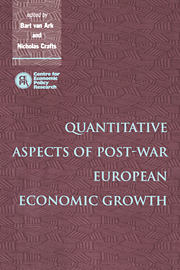Book contents
- Frontmatter
- Contents
- List of figures
- List of tables
- List of contributors
- Preface
- 1 Catch-up, convergence and the sources of post-war European growth: introduction and overview
- 2 Macroeconomic accounts for European countries
- 3 Sectoral growth accounting and structural change in post-war Europe
- 4 Measures of fixed capital stocks in the post-war period: a five-country study
- 5 Technology indicators and economic growth in the European area: some empirical evidence
- 6 Human capital and productivity in manufacturing during the twentieth century: Britain, Germany and the United States
- 7 Convergence and divergence in the European periphery: productivity in Eastern and Southern Europe in retrospect
- 8 Convergence: what the historical record shows
- 9 Growth and convergence in OECD countries: a closer look
- 10 On the historical continuity of the process of economic growth
- 11 Europe's Golden Age: an econometric investigation of changing trend rates of growth
- Index
1 - Catch-up, convergence and the sources of post-war European growth: introduction and overview
Published online by Cambridge University Press: 23 December 2009
- Frontmatter
- Contents
- List of figures
- List of tables
- List of contributors
- Preface
- 1 Catch-up, convergence and the sources of post-war European growth: introduction and overview
- 2 Macroeconomic accounts for European countries
- 3 Sectoral growth accounting and structural change in post-war Europe
- 4 Measures of fixed capital stocks in the post-war period: a five-country study
- 5 Technology indicators and economic growth in the European area: some empirical evidence
- 6 Human capital and productivity in manufacturing during the twentieth century: Britain, Germany and the United States
- 7 Convergence and divergence in the European periphery: productivity in Eastern and Southern Europe in retrospect
- 8 Convergence: what the historical record shows
- 9 Growth and convergence in OECD countries: a closer look
- 10 On the historical continuity of the process of economic growth
- 11 Europe's Golden Age: an econometric investigation of changing trend rates of growth
- Index
Summary
Introduction
Since the mid-1980s there has been a great resurgence of interest in growth economics. There are perhaps two main reasons for this. First, Americans and Europeans have become worried about growth slowing down and about catching up and eventual overtaking in productivity terms by Asian rivals. Second, new theoretical ideas have enriched earlier models, in particular, by endogenizing technical progress and by serious analysis of the roles of imperfect competition and multiple equilibria in growth outcomes.
In this new research the question that has attracted the most attention has been the convergence controversy (Romer, 1994, p. 4). Does the growth process tend to involve reductions in the gaps in income levels between leaders and followers and, if so, what does this imply for the structure of growth models? The chapters in this work all concern issues related to this debate and, in particular, explore aspects of the catch-up process in post-war European growth. At the same time, in pursuing these issues, these essays also shed a good deal of light on the part played by the accumulation of various kinds of capital in promoting differences in productivity performance.
The objective of the volume is to provide authoritative estimates of the dimensions of economic growth in Europe in an explicitly internationally comparative framework together with an evaluation of some of the competing hypotheses in the recent growth literature. As such, it complements and is complemented by a sister collection of studies of the experience of individual European countries (Crafts and Toniolo, 1996).
Historical data can often be frustrating to work with and are full of pitfalls for the unwary.
- Type
- Chapter
- Information
- Publisher: Cambridge University PressPrint publication year: 1997



